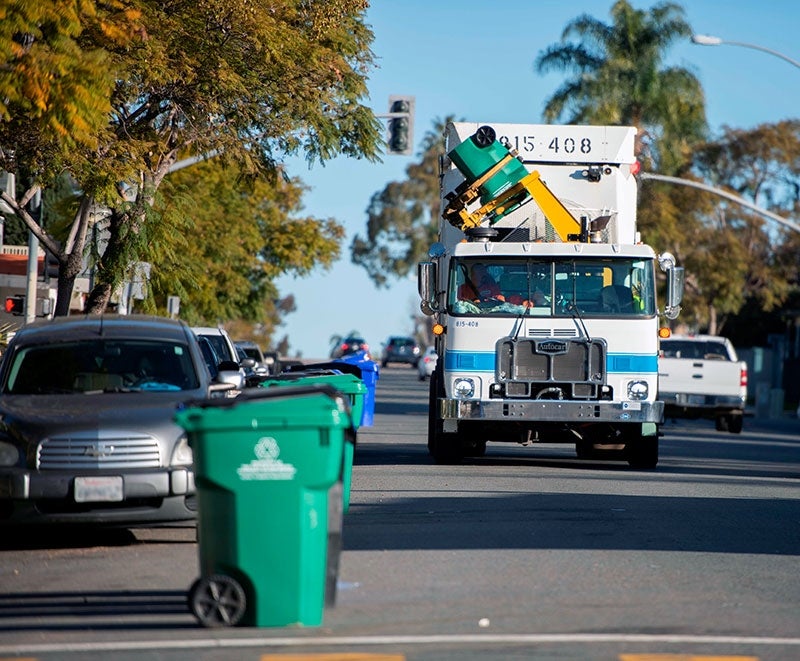We Want to Hear from You! The City of San Diego Seeks Community Input on Trash and Recycling Services
July 25, 2024 | City News Team

The City of San Diego wants to hear from San Diegans who receive trash and recycling collection services from the Environmental Services Department (ESD). Starting early August, the City will kick off a series of open house meetings to evaluate the level and types of service provided by ESD and how that would impact the cost of waste collection for residential properties.
Developing a fee structure will allow the City to provide enhanced and more tailored services, such as increased recycling collection frequency and replacement bins at no additional charge. Launching today with a new website (cleangreensd.org) and calendar of events, the City’s Community Engagement Plan will include in-person and virtual public meetings in each of the nine Council Districts, as well as focus groups and questionnaires. The City is also forming a Community-Based Organization Working Group that will foster inclusive dialogue, gather diverse perspectives and build an understanding of preferences.
In 2022, Measure B amended the “People’s Ordinance” to allow the City to charge a cost-recovery fee for trash and recycling collection services the City provides to residential properties. Such a fee would apply to approximately 285,000 residential properties currently serviced by the City. This includes single-family homes and residential complexes of four or fewer units that meet City requirements for City-provided trash and recycling collection. Currently, these properties do not directly pay for trash and recycling collection, while residents in apartment complexes and those with homeowners associations, for example, do pay private waste collection companies for these services.
“The most important component of this process is listening to what our customers want for services,” said Jeremy Bauer, Assistant Director of ESD. “Our forward-thinking, customer service-focused outreach and engagement efforts will help us elevate community voices, with a keen lens on equity and inclusion.”
Charging a fee for waste collection would not only enhance services, but also protect the environment and create a fair system by requiring all San Diegans to pay for waste collection services. It would also allow the City to allocate General Fund dollars previously spent on trash and recycling collection for only a subset of San Diego residents to City projects and services that benefit all residents. It’s important to note that under existing law, the City cannot generate a profit, but only recover the costs of providing the services as determined by an extensive Cost-of-Service Study. An efficiency analysis is also being conducted to ensure the City is being as cost-effective as possible.
San Diegans who receive collection services for trash and recycling from the City’s ESD are invited to share their input about potential service enhancements by completing a questionnaire or attending one of several community meetings. The first meeting will be held Aug. 5 at Logan Heights Library, 567 S. 28th St. Accommodations for ASL and foreign-language interpretation at meetings will be made available to those who request it in advance.
The City’s Community Engagement Plan will be used to help inform the City’s Cost-of-Service Study (COSS), which not only determines the cost of trash and recycling collection services the City is currently providing, but also enhanced services City residents want added. This is important as the City can only charge residents for the actual costs the City incurs in providing the services. The COSS, which is expected to be complete by the end of this year, will also explore a discount program for those who meet eligibility requirements.
Those who want to learn more about the COSS and to provide feedback about their preferences are invited to attend a community meeting. To reach a broad audience, 10 meetings (nine in-person and one virtual) will be held in August and September at familiar locations in each Council District. The meetings will incorporate educational materials and engagement activities, including collaborative exercises. Sustainable giveaway items, including kitchen pails (to collect food scraps) and compost samples, will be available for participants. Additional meetings are planned for this fall. Anyone can stay in the loop by joining the engagement email list and visiting the City’s webpage, which includes fact sheets, the meeting schedule and historical information about waste services in San Diego.
The San Diego City Council is expected to consider the fee schedule in June of 2025, which would be rolled out with the new customer-requested service levels over the next few months in the summer of 2025.
In-person Community Meetings by Council District (CD); 5:30 to 7 p.m.
CD8 Monday, Aug. 5 Logan Heights Library, 567 S. 28th St., 92113
CD4 Tuesday, Aug. 6 Valencia Park/Malcolm X Library, 5148 Market St., 92114
CD6 Monday, Aug. 12 Mira Mesa Library, 8405 New Salem St., 92126
CD9 Tuesday, Aug. 13 Mission Valley Library, 2123 Fenton Parkway, 92108
CD3 Monday, Aug. 19 Mission Hills-Hillcrest/Knox Library, 215 W. Washington St., 92103
CD2 Monday, Aug. 26 Point Loma/Hervey Library, 3701 Voltaire St., 92107
CD7 Tuesday, Aug. 27 Serra Mesa-Kearny Mesa Library, 9005 Aero Drive, 92123
CD5 Tuesday, Sept. 3 Scripps Miramar Ranch Library, 10301 Scripps Lake Drive, 92131
CD1 Monday, Sept. 9 La Jolla/Riford Library, 7555 Draper Ave., 92037
Virtual Meeting:
Saturday, Aug. 24, from 10 to 11:30 a.m.
About the Environmental Services Department:
The Environmental Services Department (ESD) ensures that City of San Diego residents have a clean and safe environment. The department pursues waste management strategies that emphasize waste reduction; recycling and composting; and environmentally sound landfill management.
Filter by Category
Airports (1)
Arts and Culture (9)
Business (20)
City Planning (1)
Environment (46)
Human Interest (7)
Library (14)
Parks and Recreation (21)
Personnel (11)
Public Safety (20)
Public Works (58)
Streets (1)
Technology (4)
Transportation (1)
Airports (1)
Arts and Culture (9)
Business (20)
City Planning (1)
Environment (46)
Human Interest (7)
Library (14)
Parks and Recreation (21)
Personnel (11)
Public Safety (20)
Public Works (58)
Streets (1)
Technology (4)
Transportation (1)
